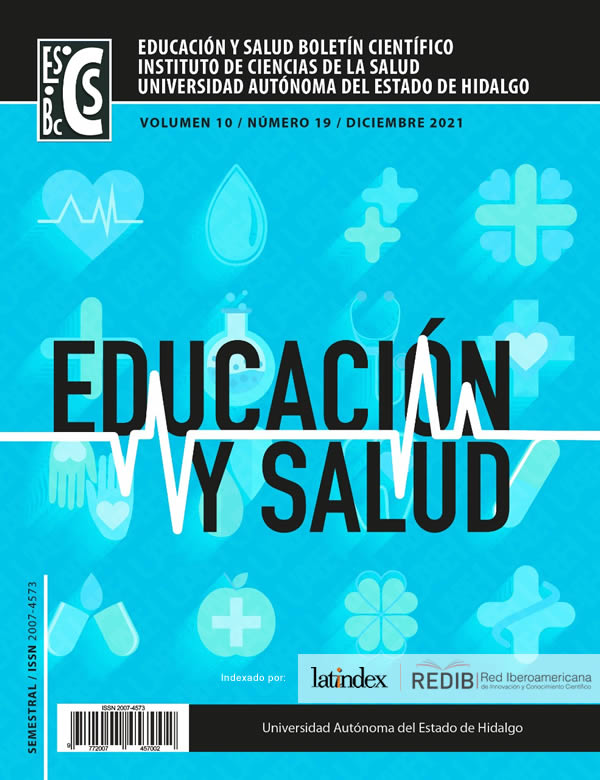And how do you get angry? Story designed to promote emotional education
Abstract
The objective of this study is to know the opinion of a group of boys and girls from four to eight years of age about a story to regulate anger. The study has a non-experimental cross-sectional design. For the collection of information, a questionnaire was applied through a google form that was filled out with the opinion of the children with the support of the parents, in a sample of 43 children, 13 children located through Facebook and WhatsApp, 9 children’s students from a Kindergarten in Pachuca de Soto Hidalgo and the rest 21 children from a Kindergarten located in Tlapanaloya, Tequixquiac State of Mexico. These were selected through accidental non-probability or snowball sampling. In the results it is highlighted that 81.40% of the children understood what anger is through the story, 95.35% liked the story, 83.72% of the children liked the backgrounds, 86.05% of the children liked the characters. Likewise, 93% of the children understood the figure of the psychologist as support to regulate emotions, they learned through history what a psychologist is and 88.4% of them validated the strategies proposed as good options to control anger. These findings indicate that the story is an excellent tool for teaching, identifying, and regulating emotions. It is concluded to observe the results and consider the use of stories as support material to educate the emotions.
Downloads
References
Begoña DD. Cuentos para sentir: educar las emociones [Internet]; 2016.Disponible en: https://www.educacionyfp.gob.es/suiza/dam/jcr:9567a845-f278-41a98b45b39d5109bd04/cuentos%20para%20sentir%20y%20edu%20las%20emoc.pdf
Bisquerra R. Educación emocional y competencias básicas para la vida. Revista de Investigación Educativa [Internet]. 2003;21(1):7-43. Disponible en: https://revistas.um.es/rie/article/download/99071/94661/0
Maqueda S. El valor de los cuentos y las emociones en Educación Infantil [Trabajo de fin de grado en Internet]. Reus: Universidad Internacional de la Rioja; 2017. Disponible en: https://reunir.unir.net/handle/123456789/4954
Beltrán MI. Los cuentos como medio de educar las emociones en la etapa infantil. 2019. Disponible en: https://bibliotecavirtualsenior.es/investigacion/los-cuentos-como-medio-de-educar-las-emociones-en-la-etapa-infantil/.
Bisquerra R. Educación para la ciudadanía y convivencia. Las Rozas: Wolters Kluwer España, S.A.; 2008. 287 p. Educación para la ciudadanía y convivencia, El enfoque de la Educación Emocional - Rafael Bisquerra Alzina - Google Libros
Bisquerra R. Psicopedagogía de las emociones. España: Síntesis; 2009. 253 p. Psicopedagogía de las emociones (codajic.org)
Carrero C. La educación emocional a través de los cuentos [Trabajo de fin de grado en Internet]. Valladolid: Universidad de Valladolid; 2020. Disponible en: http://uvadoc.uva.es/bitstream/handle/10324/32233/TFG-G3087.pdf;sequence=1
Bruder M. El cuento terapéutico como favorecedor de la resiliencia. Una primera aproximación. Dialnet [Internet]. 2006. Disponible en: https://dialnet.unirioja.es/descarga/articulo/5645393.pdf
Leiner M. Manual para la utilización del libro y viñetas incluidas en el libro de ¨Entrenamiento de acción social¨ [Internet]. Chihuahua: El colegio de Chihuahua; 2015. 36 p. Disponible en: http://www.colech.edu.mx/cont/descargables/manual-capacitacion.pdf
Spielberger C, Reheiser E. Assessment of emotions: anxiety, anger, depression, and curiosity. Applied Psychology, Health and Well Being. 2009;3(1):32.
Ortega MD. La educación emocional y sus implicaciones en la salud. Redalyc [Internet]. 2010;21(2):462-70. Disponible en: http://www.redalyc.org/articulo.oa?id=338230785025
Salas E. Estrategias de regulación del enojo en niños sordos [Tesis de pregrado en Internet]. México: Universidad Nacional Autónoma de México; 2014. Disponible en: http://132.248.9.195/ptd2014/enero/0707568/0707568.pdf
Cardemil A. Filipo se enoja [Internet]. Chile: International Public License; 2020. 11 p. Disponible en: https://www.junji.gob.cl/wp-content/uploads/2020/08/Filipo_se_enoja.pdf
Camiruaga MJ. Clementina está enojada [Internet]. Chile: [editorial desconocido]; 2020. 20 p. Disponible en: https://www.educarchile.cl/sites/default/files/2020-07/Clementina%20esta%20enojada-libro.pdf
Rodríguez DM, Perdomo S, Peña AD, Sánchez AV, Alayón OJ. Los niños y los ogros [Internet]. Caracas: Universidad Católica de Colombia; 2019. 30 p. Disponible en: https://publicaciones.ucatolica.edu.co/pdf/los-ninos-y-los-ogros.pdf
Abreu M. La ardilla y el enojo [Internet]. Cuentos infantiles con valores; 2017. Disponible en: http://www.cuentosinfantilesconvalores.com/2017/04/la-ardilla-y-el-anojo.html
Steve A. YouTube [Internet]. [Video], La rabieta de Julieta - Cuento infantil de educación emocional de Edúkame; 27 de agosto de 2015; [7 min, 31 s]. Disponible en: https://www.youtube.com/watch?v=FBROB2IMCaU&t=5s
Martí M, Salomó X. YouTube [Internet]. [Video], Qué rabia de juego! - meritxell martí y xavier salomó; 17 de mayo de 2020; [11 min, 48 s]. Disponible en: https://www.youtube.com/watch?v=iD2ShUjyDRQ
Llenas A. El monstruo de colores [Internet]. Barcelona: Flamboyant; 2016. 23 p. Disponible en: http://www.educacionbc.edu.mx/ecv/nivel/ebasica/preescolar/libro%20monstruo%20de%20colores%20pdf.pdf
Moroney T. Cuando estoy enfadado [Internet]. Marton: sm; 2007. 13 p. Disponible en: https://es.calameo.com/read/001908133a1aee0e13360
Oram H. Fernando furioso [Internet]. Sudáfrica: Ekaré; 1989. 31 p. Disponible en: https://drive.google.com/file/d/0BwOKfHVb_wZiUG9jSzU1Y0M0bTQ/view?resourcekey=0-rHm6m_V5mePBfhEVpwRYUg
Mendoza B. Manual de autocontrol del enojo [Internet]. [lugar desconocido]: Manual Moderno; 2010. 119 p. Disponible en: https://docer.com.ar/doc/n5cccs8
Schneider M, Robin A. Academia.edu [Internet]. ¨La tecnica de la tortuga¨ un metodo para el autocontrol de la conducta impulsiva; 1974. Disponible en: https://www.academia.edu/33425997/_LA_TECNICA_DE_LA_TORTUGA_UN_METODO_PARA_EL_AUTOCONTROL_DE_LA_CONDUCTA_IMPULSIVA_
Stallard P. Pensar bien - sentirse bien [Internet]. Inglaterra: Descleé de Brouwer; 2002. 258 p. Disponible en: https://tuvntana.files.wordpress.com/2015/06/pensar_bien_-_sentirse_bien__ma_-_stallard_paul1.pdf











